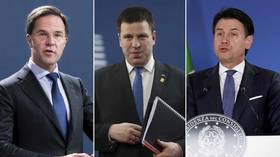European democracy is in the dock as Dutch and Estonian governments collapse with Italy also on the brink, thank God for Brexit

Scandals and self-interest have rocked and toppled governments across the EU bloc while Brussels drags its feet on rolling out large-scale coronavirus vaccinations and lockdown restrictions increase for fed up populations.
So dire has been the coronavirus vaccine rollout across Europe that it has taken all the focus off the democratic deficit that has suddenly befallen the bloc with two governments collapsing and a third on the brink in the space of less than a week.
Understandably, many Brits, glad to be cut adrift, will be chortling over their full English breakfasts at this continental shambles.
Also on rt.com ‘Unacceptable’: 6 EU countries urge bloc to address Pfizer Covid-19 vaccine delays, as Canada also flags supply issuesBecause this is not how the grand project was meant to turn out. The so-called advanced Western democracies are being exposed as cabals of vested interests, handshakes in smoke-filled rooms, and the greed for power resulting in minority governments created from artificial but politically expedient agreements that operate on a knife edge.
It is democracy at its worst.
The liberal torchbearer of the European Union, Dutch Prime Minister Mark Rutte is the latest to succumb. He was prepared to weather the storm that has rocked the Netherlands after 26,000 parents were wrongly accused of child benefit fraud between 2013 and 2019.
But he was convinced to U-turn on his pledge to remain in power by his coalition partners, showing just how sour these political marriages of convenience can turn when things go bad.
Under the guise of magnanimity, Rutte said: “With this decision, the government wants to do justice to all those parents who have been unprecedentedly wronged.” Although he’s resigning to the King of Netherlands, he has no plans to go anywhere and will stay in office as caretaker PM until elections are held in March.
By then, I dare say, he will be hoping that the worst of the pandemic will have blown past, the messy benefits scandal forgotten and it will be business as usual. With his People’s Party for Freedom and Democracy nearly 20 points clear of its nearest rival in the polls at the moment, he might even be able to govern without the inconvenience of make-weight minor partners.
This latest scandal could turn out to be the best thing to happen to Rutte in quite some time. Who woulda thunk?
Also on rt.com ‘Innocent people were hurt’: Dutch government resigns over childcare subsidies mismanagement scandalMeanwhile, further north, the Estonian government has also collapsed with PM Jüri Ratas resigning after a prominent businessman and a key government adviser were both accused of impropriety over the €39 million Porto Franco property development.
Like Rutte, Ratas is also in a power-sharing agreement, with the conservative Fatherland party and the Eurosceptic right-wing Conservative People’s Party of Estonia and like most parties with populist ambition, if they smell blood in the water then they will attack. Best to lead them off the scent by resigning, hoping the storm passes and regrouping in time for the next election.
Again, this is egregious political expediency, not honourable men ascending to the moral high ground.
Elsewhere, in Italy, former PM Matteo Renzi has pulled his Italia Viva party’s ministers from the coalition government he supports in Rome, leaving the nation's incumbent leader Giuseppe Conte on the brink after simmering arguments over the €222 billion post-coronavirus recovery plan. Unless he can urge Renzi to return to the fold, presumably offering him more lucrative roles for his pals, then the Italians should be off to the polls.
With more than 70,000 people dead from the coronavirus and a vaccine rollout widely criticised, the days of surging popularity for Conte and the largest coalition partner, Five Star Movement, are in the past and populist firebrand Matteo Salvini and his Lega Party are ready to pounce. Understandably, Italians are disgruntled. Do you really want to do this now?
While the Italians are certainly used to coalitions in power, that does not mean any have been a success. Since the Italian republic was founded in 1946, it has had more than 60 different governments – almost one a year – and 29 prime ministers. Conte himself has led two since he took office in 2018.
The constant scheming and intrigue involved in grasping at power make it virtually impossible to govern when those in charge spend most of their time looking over their shoulders trying to ensure there’s no one waiting to knife them in the back.
While Italy demonstrates coalition government at its most moribund, this self-interested style of politics shared by the Netherlands, Estonia and others exposes the rot at the core of the European project.
Because this brand of governance means that many politicians who lead the governments that comprise membership of the EU are simply not wired to deal with blue-sky ideas, pan-European issues and the challenging, almost-impossible consensus-building required to effectively implement ever-closer union.
Also on rt.com Pfizer reducing Covid-19 vaccine deliveries to Europe while it steps up production, Norway saysSelf-interest, nepotism, compromise, bluff, bullying, U-turns and secret deals are among the tools used to achieve and maintain power within their domestic governments which prove weak and ineffectual under coalition. But they continue to wield those once they’re at the top table in Europe, this time with the eyes of 400 million citizens turned towards them.
Knowing where these men and women have come from, this simply means their failures are as much understandable as they are inevitable. If this is modern European democracy, all I can say is, thank God for Brexit.
Think your friends would be interested? Share this story!
The statements, views and opinions expressed in this column are solely those of the author and do not necessarily represent those of RT.















